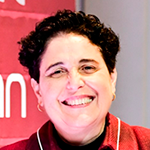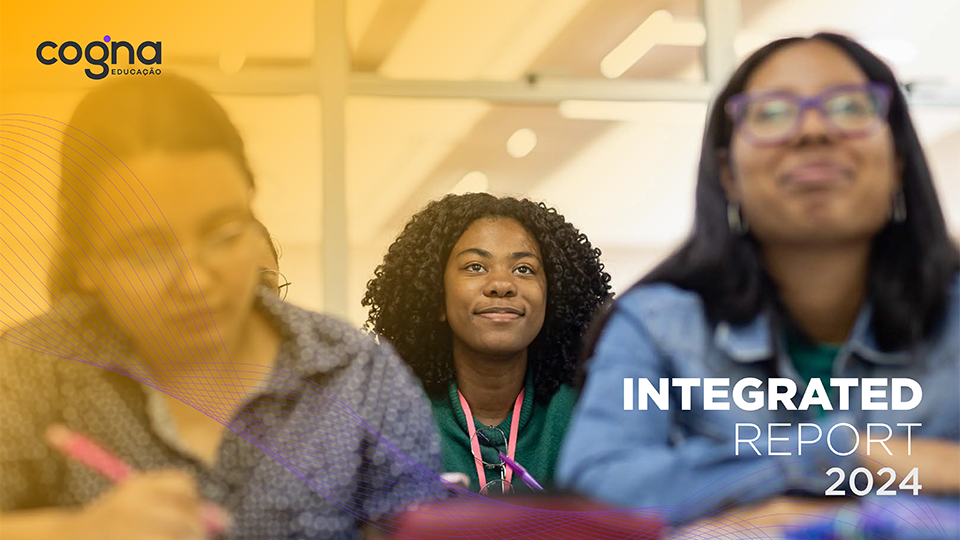News
III EDUCATION & ESG Cogna Forum
07th December, 2023In our III EDUCATION & ESG Forum, held on December 7, 2023, we debated emerging themes on the sustainability schedule.
PANEL 1: 2:40 pm to 3:30 pm
Diversity from the perspective of neuroscience and mental health
Understanding the importance of diversity from the perspective of neuroscience and mental health is a relatively recent field of study, but one that proves to be essential in the search for more inclusive and healthier societies. The way our brains process, react and adapt to diversity plays a key role in promoting psychological well-being and creating environments that respect and value individual differences and drive positive change in our communities and societies as a whole.
Panel Mediator:

Graduated in History and Master in Social Anthropology, she is the pedagogical director at Somos Educação where she coordinates Science in Learning, PROFS (online course platform for teacher training) and study groups on digital transition and the impacts of Artificial Intelligence.
Guest panelists:

Pedagogue, psychoanalyst and Researcher at INCT Brasil Plural (INCT/Cnpq). PhD student in Social Anthropology, Master in Education: History, Politics, Society at PUC-SP. Founder and president of Instituto Di Jejê.

Master and PhD in neurosciences. Founder of Glia Neurociência and founding partner at Athention, a neurotechnology company applied to education.

Specialist in Cognitive Neuroscience, founder of SOS Educação. Author of the book “Help, my son doesn’t study!” , columnist for the newspaper Estadão and presenter of the podcasts SOS Gestor Escolar and PodEducar, the family and education videocast.
PANEL 2: 3:40 pm to 4:30 pm
Governance and integrity: The importance of transparency in business
Corporate integrity goes beyond compliance with laws and regulations. It encompasses the adoption of ethical practices, transparency in operations, social responsibility and commitment to truth and justice. Lack of integrity can result in irreparable damage to reputation and trust, directly affecting the viability and growth of organizations.
We will discuss the challenges and benefits for corporate integrity, highlighting the need to disseminate and promote the best compliance and integrity practices, which have gained greater relevance for all types and levels of organizations, and how to promote a culture of integrity that permeates all the interests of stakeholders.
Panel Mediator:

Compliance and Investigations Specialist and Compliance and Privacy Manager – DPO at Cogna Educação.
Guest panelists:

Master in Public Administration and Urban Planning. Deputy coordinator of the people committee, instructor in the training courses for Board Members, audit committee, people committee and governance officer at IBGC.

Compliance specialist. He led the development of a Compliance Program that won the Pró-Ética and Top Of Mind Awards, and is currently a partner at SPRB Advogados.

Compliance, audit, investigation and fraud specialist and Compliance and Investigation Manager at Ernst & Young.
PANEL 3: 4:40 pm to 5:30 pm
Climate Risks: A call for adaptation
Climate change is one of the most urgent challenges facing humanity in the 21st century. Scientific studies point to a constant increase in the frequency and severity of extreme weather events. Between 2000 and 2019, there was an approximately 35% increase in climate disasters compared to the previous decade, marking floods, hurricanes, prolonged droughts and intense wildfires as the most frequent events, affecting millions of lives annually.
Estimates project that, if current trends persist, more than 100 million people could live in extreme poverty by 2030 due to the effects of climate change. In 2022 alone, economic losses resulting from natural disasters around the world reached the USD 313 billion mark. It is alarming to note that 73% of these global losses were recorded in Brazil.
These numbers highlight the urgency of coordinated actions and global policies to mitigate climate risks. Faced with this critical scenario, the question arises: What tools can be used to effectively manage the risks associated with climate change?
Panel Mediator:

Bachelor’s degree in International Relations, MBA in Environmental Management and specialization in ESG. She is currently Sustainability Coordinator at Cogna Educação.
Guest panelists:

PhD in Geography, researcher at the National Center for Natural Disaster Monitoring and Alerts (Cemaden). Since 2003, she has worked on the topic of disaster risk, with an emphasis on socio-environmental vulnerability, civil protection and defense and disaster risk management.

Engineer with solid experience in Mergers and Acquisitions. He was involved in founding several social organizations (NGOs) and remains today a member of the supervisory board of Gastromotiva and the board of the Alpha Lumen Institute. He is co-founder and CEO of DEEP ESG.

Full Professor at the Department of Atmospheric Sciences at the University of São Paulo, coordinator of the Climate Change Research Center (INCLINE) and director of the Institute of Energy and Environment at USP.

Environmental engineer and master in energy planning, he has been working on topics related to sustainability for 10 years. He is currently Climate Risk and Adaptation Coordinator at Way Carbon.
Additional references mentioned in the III ESG Forum:
- “Mudanças Climáticas e Sociedade” (Book (PT-BR);
- Video (YouTube): Palestra de Premiação: William D. Nordhaus, Prêmio em Ciências Econômicas 2018;
- Kurzgesagt – We Will Fix Climate Change (Video in English – subtitles in Portuguese-BR);
- Rádio Novelo – Tempo Quente (Podcast Series PT-BR);
- Climate Psychology Alliance – Climate Crisis Conversations (Podcast Series – EN);
- Mary Robinson – Justiça Climática (Book (PT-BR);
- Website (PT-BR) Cemaden Educação;
- Database and report on populations in at-risk, produced in partnership by Cemaden and IBGE.
